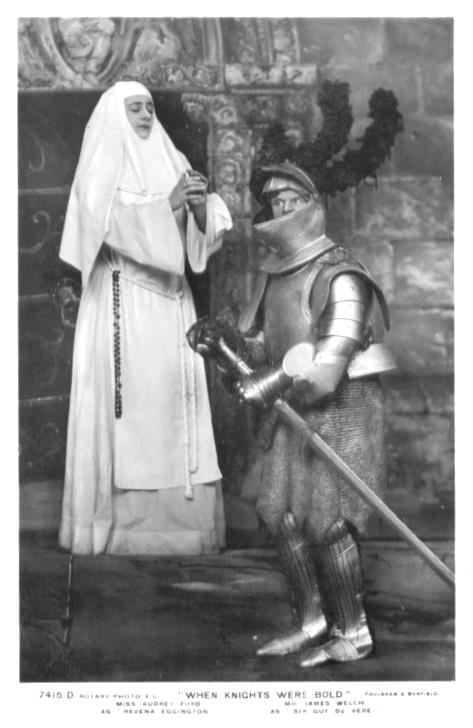When Knights Were Bold
- by Harriet Jay and Robert Buchanan
- Play
- Romance, Comedy
- Adults
- Debatable Time Travel
- English
- When Knights Were Bold, as by Charles Marlowe (at the Theatre Royal, Nottingham, UK, 17 September 1906).
The plot of . . . “When Knights Were Bold,” is more or less original as modern comedies go. It circles round the love affair of a man and a maid. In the first act, a very twentieth century one, the hero, despite the pronounced encouragement of the heroine, fails to screw up his courage to the proposing point. When alone he can declare his love manfully enough, but in the maid’s presence he becomes as shy as an early Victorian school miss. As the curtain falls, he writes himself down as an ass, takes a big drink, smokes a cigarette, and—dreams.
Act II represents the dream. It is the medieval age—the age of chivalry, of bold, bad barons and gallant knights. An ancestor of the hero is one of these latter. His love story is depicted vividly. There is nothing lackadaisical about the lovemaking. The bold knight finally seizes the maiden in his arms and carries her off bodily to the altar in the face of strenuous opposition.
In act III the twentieth century again appears. There hero wakes up and follows, so far as modernity will let him, the example of his ancestory shown him in the second act.
— San Francisco Call, 14 December 1906
Act II represents the dream. It is the medieval age—the age of chivalry, of bold, bad barons and gallant knights. An ancestor of the hero is one of these latter. His love story is depicted vividly. There is nothing lackadaisical about the lovemaking. The bold knight finally seizes the maiden in his arms and carries her off bodily to the altar in the face of strenuous opposition.
In act III the twentieth century again appears. There hero wakes up and follows, so far as modernity will let him, the example of his ancestory shown him in the second act.
— San Francisco Call, 14 December 1906
Sadly, we haven’t tracked down the script (possibly because it was never published), but we know from several reviews that the modern day Sir Guy loathes the very mention of days of old.

Tags
(5)
- Time Periods
- Middle Ages (AD 476 to 1454): 1196 AD
- Circa AD 1900 to 1929: 1906, the date of the first performance
- Time Travel Methods
- Themes
- People from Different Times Look Exactly Alike: Same actress for Lady Rowena (20th century) and Lady Revena (Middle Ages)
- Real-World Tags
Variants
(2)
- When Knights Were Bold, as by Charles Marlowe (at the Theatre Royal, Nottingham, UK, 17 September 1906).. . . . . . . . . . . . . . . . . . . . . . . . . . . . . . . written by Harriet Jay as by Charles MarloweRobert Buchanan [uncredited]
- original title of first unproduced play.Good Old Times, as by Robert Buchanan and Charles Marlowe (unproduced, circa 1896).. . . . . . . . . . . . . . . . . . . . . . . . . . . . . . . written by Harriet Jay as by Charles Marlowe
Translations
(3)
- Danish.
Blandt bolde riddere [Among bold knights], as by Charles Marlowe (at Nationaltheatret, Oslo, Norway, 23 January 1923).. . . . . . . . . . . . . . . . . . . . . . . . . . . . . . . written by Harriet Jay as by Charles MarloweRobert Buchanan [uncredited]. . . . . . . . . . . . . . . . . . . . . . . . . . . . . . . translated by unknown persons - Dutch.
Die gulden riddertijd [The golden age of chivalry], as by Charles Marlowe (at Koninklijke Vereeniging Het Nederlandsch Tooneel, Amsterdam, 27 March 1915).. . . . . . . . . . . . . . . . . . . . . . . . . . . . . . . written by Harriet Jay as by Charles MarloweRobert Buchanan [uncredited]. . . . . . . . . . . . . . . . . . . . . . . . . . . . . . . translated by unknown persons - German.
Die goldene Ritterzeit [The golden age of knights], as by Charles Marlowe (at Wiener Lustspieltheater, Vienna, 1910).. . . . . . . . . . . . . . . . . . . . . . . . . . . . . . . written by Harriet Jay as by Charles MarloweRobert Buchanan [uncredited]
Derived Works
(4)
- When Knights Were Bold by Frank Miller (early screenwriter), directed by Maurice Elvey (May 1916).
- Il cavaliere del silenzio by unknown writers, directed by Oreste Visalli (June 1916).
- When Knights Were Bold [writer unknown], directed by Tim Whelan (February 1929).
- When Knights Were Bold by Douglas Furber and Austin Parker, directed by Jack Raymond (19 February 1936).
Indexer Notes
(2)
- Credits—We list Robert Buchanan as an uncredited author based on the analysis at robertbuchanan.co.uk.
- Variants—The data on the translations is from robertbuchanan.co.uk, with verification of the Oslo performance at the Norwegian Wikipedia. However, we don’t really know whether these were English performances or in the language of the city where it was performed (or in the case of Blandt bolde riddere possibly a Danish performance in Norway). The only information on the translators given at those sites is that Siegfried V. Lutz translated a published version of Die golden Ritterzeit in 1910, but we don’t know if this was also the 1910 play performed in Vienna.
